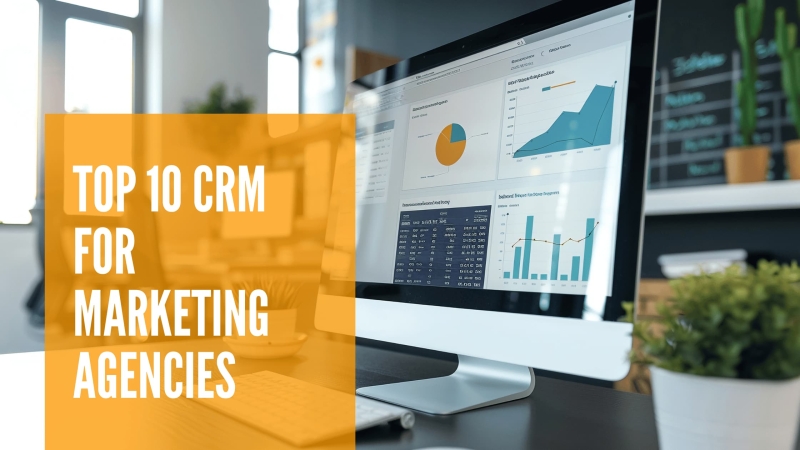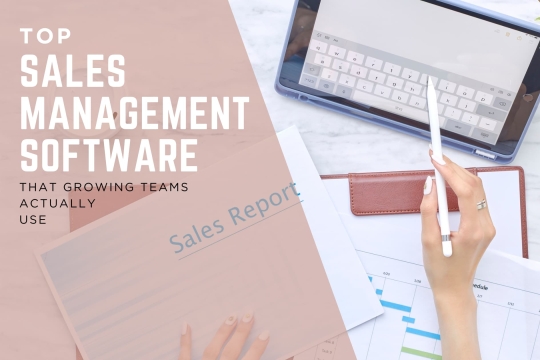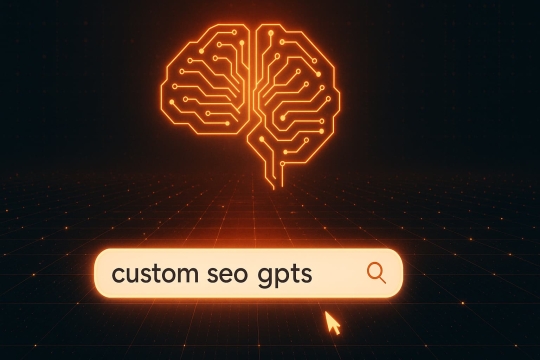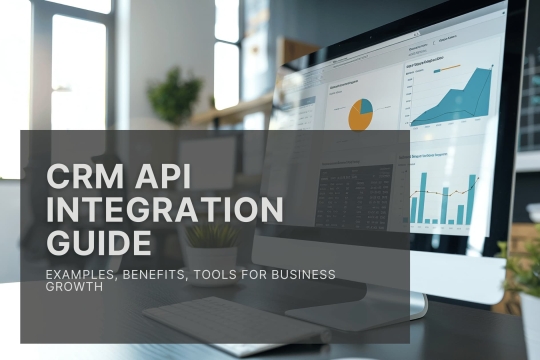We’ve done the heavy lifting, so you don’t have to. Discover which CRM tools are tried and true and have earned their spot on our list of the best CRM solutions for marketing professionals this year.

What is a CRM? (Customer Relationship Management)
A CRM is a dedicated customer relationship management software that allows businesses to store, manage, and track client interactions in one platform. The core features of a crm software are:
- Contact management—a core feature of any CRM software—is where you store and organize all of your customer data and information. Log email exchanges between your sales team and clients, and customize your customer data fields to suit your specific business needs.
- Lead management—these tools are designed explicitly with marketing teams in mind, making it easy to track leads, manage contacts, automate repetitive marketing tasks, and guide customers through every step, from initial contact to closed deal.
- Sales automation—leverage software to automate repetitive, manual sales tasks, freeing up salespeople to focus on building relationships and closing deals.
- Lead generation—identify, attract, capture, qualify, and nurture prospects toward conversion.
- Reporting and analytics—optimize business processes and strategies through advanced reporting features, along with additional functionalities such as quoting and triggered follow-ups.
- Marketing automation—create automated nurture campaigns and send mass emails that use the most updated and personalized customer data.
With the right CRM, creating personalized marketing campaigns that connect with clients, staying on top of tasks to keep teams organized, and fine-tuning business processes for continual growth is possible.
Functions that a CRM for Marketing Agencies Should Have
A CRM dedicated to marketing agencies should include features and tools that make managing clients easier, bolster your marketing efforts, and continue to nurture your existing clients and business relationships. Ideally, any CRM should help your team work smarter (not harder). Still, for marketing firms in particular, you'll want a CRM that prioritizes three key areas: campaign management, sales pipelines, and client communication, to help foster repeat business.
We’ll consider these key points when reviewing the best CRM for agencies. Keep reading to learn more about the top CRM software and how it can help your marketing agency thrive.
Best CRM for Marketing Agencies

1. Pulse CRM
Pricing: Pulse's plans range from $49 to $199 a month, each with full feature access. Save 25% by paying annually. You can add extra users for $15/month and an additional 5,000 contacts for $50/month to any of the plans.
- The Starter package is $49/month with one user and 500 contacts (or $36.75 paid annually).
- Growth is the second tier, with three users and 1,000 contacts for $119/month (or $89.25/paid yearly).
Free version: Pulse doesn’t offer a freemium CRM, but a 14-day trial is available to test the software.
If your agency is experiencing CRM fatigue from the overloaded features you hardly use, Pulse offers a refreshing alternative to the clutter. The platform strips away distractions, focusing on a clean and intuitive interface that allows teams to manage leads and track progress in sales pipelines without getting sidetracked.
Pulse's CRM enables your team to quickly locate client and customer data, eliminating the need to scatter briefs, team notes, and campaign progress across different apps. The platform centralizes your work tools and information, making them easily accessible across your entire team. Account managers, strategists, and creatives can view the same information and updates in real-time through collaborative work software, significantly reducing roadblocks and delays.
- No hidden costs
- Easy for teams to use and navigate
- Highly supportive, personalized onboarding
- Mobile-friendly for managing clients on the move
- Customer satisfaction is top-notch
- Advanced automation takes some time to learn
- Newer platform with a smaller user base than industry leaders
User Reviews
Pulse CRM reviews are remarkably positive, with users highlighting its straightforward simplicity and stellar customer and onboarding support. Agencies frequently note the transparent pricing and minimal learning curve that allows for quick team adoption without extensive training.
This Software is Best For ...
Growing small to mid-sized marketing agencies that want to avoid overly saturated and complex tools with pricey add-ons and steep payment plans.
2. Copper
Pricing:
- The Starter Plan costs $12 per user/month (monthly) or $9 per user per month (annually).
- The Basic is $29/user/month, paid monthly, or $23/user/month billed annually. $134 per user per month (billed annually).
- The Professional plan is $69/user/month (monthly) or $59 per year.
- Business plans increase to $134/user/month (monthly), or $119 paid annually.
Free version: There's no free version, but a 14-day free trial is available with no credit card required.
Copper CRM is the official tool for businesses and agencies that rely heavily on Google Workspace. It's deeply compatible with Google applications and seamlessly links with essential CRM tools (i.e., Gmail, Google Calendar, and Google Drive).
It brings your CRM directly into your inbox with a handy Chrome extension, allowing you to capture leads and manage client relationships without needing to switch between different tools. Its simple design makes it easy for creative teams to pick up quickly, letting them focus on their work instead of figuring out complicated software.
Copper's usefulness lies in its automatic capture of contact information and tracking of emails from Gmail, which reduces manual data entry and ensures your team is always informed about the status of each client. It also offers customizable pipelines, workflow automation, and other advanced features to help marketing agencies stay organized across multiple client projects.
- Deep Google Workspace integration with a CRM
- Automatic contact and email tracking
- Balances usability with functionality
- Gives a clear overview of the sales process
- Strong mobile apps for managing work on the go
- Lacks email marketing functionality and custom reporting on lower-tier plans
- Can be expensive for larger teams
- Not as feature-dense as other CRMs (Hubspot, Salesforce)
- Not ideal for teams not set up with Google Workspace
User Reviews
Copper reviews are exceptionally positive regarding its deep, native integration within Google Workspace. Users enjoy the ability to manage deals and contacts directly from their Gmail inbox, which automates much of the data entry process. Common complaints highlight reporting features that are less robust than those of competitors, as well as inconsistent customer support after purchase.
This Software is Best For ...
Small-to-medium-sized marketing agencies that use Google Workspace and want a simple, intuitive CRM that reduces automative work and fits naturally into their existing workflows.
- New to CRMs and don’t know where to start?
- Stuck with a broken setup that someone else botched?
- Tried the DIY route but know it’s not working the way it should?
At PointsPeak, we help businesses:
- Choose the right CRM for their needs
- Clean up and rebuild messy, underperforming setups
- Fix automation issues that cost you leads and sales
- Build scalable, conversion-focused systems that grow with you
3. HubSpot
Pricing: Paid plans vary in price based on the chosen hubs, subscription tiers, and number of users.
- The Starter plan is $9 per month per seat, and is suitable for individuals and small teams.
- The Professional plan is $90/month/seat, and the Enterprise plan is $150/month/seat.
Contact HubSpot's sales team to learn more about their pricing plans.
Free version: Yes; HubSpot is known for its substantial freemium CRM, which supports up to 1 million contacts, along with basic marketing tools (2,000 emails/month), forms, live chat, and sales pipeline management.
HubSpot is an all-in-one platform for inbound marketing, sales, and service. You're likely familiar with the name, or perhaps you've used HubSpot's Free Tools Plan in the past. With nearly a third of the CRM market share, HubSpot and Salesforce dominate the CRM industry—but are they the right tools for you?
What started as a CRM system has evolved into a massive, all-in-one platform with various "hubs" for marketing, sales, service, content, and operations. Everything interconnects through a single database, so your team sees the same customer information regardless of which department they're in.
For marketing agencies, the standout feature is its ability to manage everything in one place. You can build websites, email campaigns, track leads, manage social media, and see how your marketing efforts translate into tangible results for your business.
- Everything integrates seamlessly (reducing data silos)
- Standout marketing capabilities
- Super detailed reporting to show clients their ROI
- Extensive integration options with other third-party tools
- Substantial free plan includes 1,000 users, email marketing, tracking, and landing pages
- Gets expensive fast as you add features and marketing contacts
- There's a learning curve to some features
- Requires time to set up correctly and customize
- Advanced features require paid plans, which are expensive
User Reviews
Users emphasize HubSpot's unified approach, with one agency owner saying it "completely transformed how we track client results." Marketing teams appreciate the automation features that enable them to set up complex campaigns without requiring technical assistance.
Some smaller agencies mention feeling overwhelmed by all the features and that "it can take months to master everything it offers." The most common complaint is about how quickly costs increase when scaling up.
This Software is Best For ...
Growing marketing agencies that are ready to graduate from the more basic tools to an elaborate system that scales.
4. Nimble
Pricing:
The two main pricing plans, both billed per user per month: $24.90 annually and $29.90 monthly.
The base plan includes 25,000 contacts and 2 GB of storage per seat, with add-ons available for additional contacts, storage, and features.
Free version: There is no free version, but the 14-day free trial doesn't require a credit card.
Nimble is built on a simple premise: your CRM should work where you do, not the other way around. Instead of being another tab you have to remember to open, it lives as a smart browser extension and a mobile app that brings customer relationship management directly into your inbox, social media feeds, and across the web.
The CRM automatically builds and fills in contact profiles for you. By scouring emails, calendars, and connected social networks, it creates a cohesive view of every contact, saving countless hours of manual data entry. For an agency that does a lot of prospecting across LinkedIn, email, and Twitter, this gives deep insights into who someone is without ever leaving the page you’re on.
What you gain in convenience, however, you trade in the breadth and depth of features. Nimble isn’t trying to be an all-in-one business suite; it lacks basic functions such as native invoicing and comprehensive project management. With no free plan and relatively low storage limits, it’s a focused tool for a specific job: helping hyper-networked professionals master their outreach and follow-ups with minimal effort.
- Works inside your email and social media platforms
- Automatically enriches contact profiles with social and business data
- Easy contact capture from any website with the Prospector browser extension
- Simple, straightforward pricing with just one main plan
- Great for relationship-focused selling and networking
- Limited to 100 group emails per user per day
- Not as feature-rich for marketing as other CRMs
- It might be too basic for larger teams with complex needs
- The mobile app is reportedly slower than the desktop version
User Reviews
Nimble reviews emphasize its strength in automated data enrichment and social selling. Users frequently cite the Prospector browser extension as a significant time-saver, noting how automatic contact enrichment provides valuable social insights before meetings. Criticisms focus on the platform’s limited bulk email marketing capabilities and the need to purchase add-ons for more advanced features.
This Software is Best For ...
SMBs and small marketing agencies (or solopreneurs) who primarily work in Google Workspace or Microsoft 365 and want a simple CRM that focuses on long-term customer relationships rather than complex automation.
5. Apptivo
Pricing: Plans are available with both monthly and yearly payment options.
- The Lite plan is $15/user per month/ billed yearly, or $20 per month billed monthly.
- The Premium plan is $25 per user per month (billed annually) or $30 per month (billed monthly).
- The Ultimate plan is $40 per user/month, billed annually, and $50 per user per month, billed annually.
Free version: No free version is available; however, a free trial is offered.
Apptivo is less of a specialized CRM and more of a comprehensive business management suite, with project management, invoicing, and client tracking all neatly integrated into a single, interconnected system. This "operating system" approach makes it a compelling proposition for agencies that want to run their entire operation—from lead capture to final payment—on one platform.
The idea is to create a seamless workflow where a contact becomes a lead, that lead turns into a project, and the project's milestones can be billed directly. For a marketing agency, this means you can manage a client's campaign, track billable hours, and send invoices all within the software. It’s a powerful concept for businesses that require all-in-one efficiency.
However, this ambition comes with some setbacks: it's a "jack-of-all-trades, master-of-none" scenario. While it offers a vast feature set, the individual tools aren't as polished or as deep as those of its competitors. The user interface is dated, and navigating the apps and settings requires patience. While its paid plans are customizable, Apptivo is a tool best suited for agencies that prioritize comprehensive integration over best-in-class functionality in any single area.
- Combines CRM with project management and financial tools
- Customizable to fit different workflows
- Good value compared to purchasing separate systems
- Mobile apps are available for iOS and Android
- 24/7 customer support
- Takes time to learn due to the number of features
- The interface can feel dated and occasionally lag
- Some users find it unnecessarily complex
- Email has sending limits per user
- Occasional bugs reported by users
User Reviews
Apptivo reviews are broadly positive, with users highlighting its value as an all-in-one business management suite. Many cite the benefit of replacing multiple software subscriptions with a single platform and note the quality of its customer support. Some criticize the steep learning curve required to navigate its extensive features, as well as reports of occasional performance slowdowns.
This Software is Best For ...
Agencies that are looking to consolidate their tech stack into a centralized system instead of managing multiple subscriptions for sales and task management.
6. Monday CRM
Pricing: See pricing plan
- Monday's paid plans include the Basic plan, which is $12 per user per month.
- The Standard plan costs $17 per month, while the Pro plan is $28 per user per month.
- All plans require a minimum of 3 users. The Enterprise plan uses custom pricing.
Free version: There's no free version, but a 14-day free trial to test the features beforehand.
Monday.com began as a project management tool, but the company has since evolved to launch several products, including its powerful, highly visual CRM. What's immediately noticeable is the inventive use of colour that governs the sales pipeline logic. Visual learners say it lets them understand their entire sales pipeline at a glance (and just as easily drag-and-drop deals between pipeline stages).
Monday CRM's USP is its built-in automation, which is based on pre-built templates, allowing for customization and task automation to be set up with little fanfare. With its intuitive drag-and-drop interface, you can customize everything from lead capture forms to sales reports, as well as "streamline sales activities from pre- to post-sales" (according to Monday.com).
- A highly visual interface makes it easy to understand your sales pipeline
- Exceptional customization options for fields, statuses, and automation
- Strong task management and collaboration features
- Excellent integration with other tools
- Powerful reporting and dashboard options
- It can take time to set up properly due to the flexibility
- Personalized campaign capabilities aren't as robust as dedicated platforms
- No built-in calling features without integrations
- Analytics lacks some advanced statistical capabilities
- Requires at least three users to start
User Reviews
The platform receives strong feedback for its user-friendly interface and customization options. Marketing teams particularly appreciate how easily they can track campaign performance and client progress. A common criticism is that the number of options and actions available can be overwhelming and take time to navigate proficiently.
This Software is Best For ...
Visual thinkers and teams who want total control over their CRM layout (rather than adapting their workflow to some prebuilt pipeline and sales cycle).
7. Insightly
Pricing: See pricing plan
- The Plus plan starts at $29 per user per month.
- The Professional plan is $49 per user per month.
- The Enterprise plan is $99 per user per month.
Free version: There is currently no free version, but they offer a free trial.
Insightly’s "insight" (to use a familiar phrase) is to solve an age-old agency headache: the hand-off between the sales team that closes a deal and the team responsible for executing. In response to the conundrum, Insightly directly integrates its CRM with a project management suite, providing a comprehensive view of the client lifecycle for enhanced transparency and accessibility.
When a deal is marked as "won," it can be instantly converted into a project, carrying over all relevant client data, notes, and contacts. The flow maintains momentum and ensures seamless continuity of work, so nothing gets lost, and project managers have a complete context from day one. It’s an innovative system designed to keep sales and project delivery perfectly in sync.
Additionally, Insightly offers a substantial marketing tool for creating email campaigns and landing pages. While it may not have the raw automation power of a dedicated tool like ActiveCampaign, its assets are in keeping sales, marketing, and project data all readily available and centralized. For agencies that need to manage the entire client journey, from first touch to final report, Insightly offers a uniquely integrated solution.
- Direct conversion from sales deals to delivery projects
- Marketing tools built into the platform
- Works well with Google Workspace and Microsoft 365
- Customizable pipelines and workflows
- Links contacts to show relationships between people
- Older interface design compared to newer CRMs
- Setup takes more time than simpler systems
- A mobile app sometimes has performance issues
- Lower-tier plans have limited customization
- Support response times can be slow
User Reviews
Insightly reviews are often positive, with users highlighting its strong integration with Google Workspace and its unique sales-to-project management workflow. The ability to convert a closed deal directly into a project is said to be a benefit for streamlining operations. Common complaints, however, focus on a steep initial learning curve and reports of technical bugs within the mobile app.
This Software is Best For ...
Teams looking to bridge the gap between winning new business and delivering client work, especially those that want integrated marketing tools without additional integrations.
8. EngageBay
Pricing:
- Paid plans start with the Basic at $12.74 per user per month.
- The Growth plan jumps to $49.99 per user/month.
- The Pro plan is $101.99 per user/month.
Nice—You can purchase CRM features individually or as part of a bundled package. Discounts are available for annual payment.
Free version: A substantial free plan that includes 500 contacts, personalized campaigns, landing pages, and core CRM features.
Positioning itself as a direct, budget-friendly alternative to giants like HubSpot, EngageBay combines marketing, sales, and support tools into a single, unified platform. This all-in-one approach proves an advantage for agencies that want to streamline their tech stack without managing (and paying for) multiple subscriptions.
The toolkit is surprisingly competent for the price point. It covers the essentials from email campaign builders and automation sequences to a solid sales pipeline and helpdesk features. The outcome is a platform that enables growing agencies to manage both client campaigns and business development through a single dashboard.
The UI prioritizes functionality over anything, so its main drawback is a more limited selection of native integrations compared to enterprise-level systems. Still, for its affordability and breadth of features, EngageBay is a compelling option for startups and one of the strongest contenders in the market for CRMs for marketing agencies on a budget.
- Comprehensive feature set at a much lower price point
- Strong marketing and automation capabilities
- Good contact management and pipeline visualization
- Free plan that's useful for small agencies
- Consolidates multiple tools in one platform
- The interface isn't as polished as premium alternatives
- The mobile app has limited functionality
- Some features require higher-tier plans
- Email sending limits can be restrictive
- Occasional performance issues reported
User Reviews
EngageBay reviews are widely positive regarding its value for money, with users frequently noting its comprehensive features at a low price point. Small businesses often mention switching from more expensive systems without losing core functionality. On the other hand, some users cite occasional software bugs and an interface that may feel less polished than those of premium alternatives.
This Software is Best For ...
Budget-conscious marketing agencies are interested in an all-in-one software platform that doesn't require spending thousands on more advanced marketing features.
If you’re thinking, “There’s probably a better way to do this…” — you’re probably right.
9. ActiveCampaign
Pricing: See pricing plan
- The Starter begins at $15/month for 1,000 contacts and 1 user.
- The Plus is $70/month. The Pro Plan is $79/month; Enterprise jumps to $145/month.
Note: Subscription price increases based on the subscriber count and additional features. A 20% discount is available when you opt for annual payments.
Free version: There's no free version. A 14-day free trial with features from the Pro plan is available, but it is limited to 100 contacts and 100 emails per month.
Creative agencies serious about personalized customer experiences (mostly via email campaign automation) should already be familiar with the name ActiveCampaign. If you're not, pay attention—it's reputed as the best email automation software in 2025.
Advertised by the company as “an intelligence marketing automation platform that can help build frictionless customer experiences that delight your audience and drive growth.” The built-in CRM functionality enables you to connect your sales and client information, which is likely what they mean by "frictionless customer experience".
Its strongest asset, however, lies in the deep behavioral tracking—monitoring site visits, link clicks, and content engagement to trigger hyper-personalized follow-ups for clients. These insights (as we know) are crucial across areas of business growth and development; however, they come with two notable caveats: price and complexity. ActiveCampaign sits at the higher end of the pricing spectrum, and its CRM is bundled into its more expensive "Sales" plans. For agencies with the budget and technical skill to harness it, it's an automation engine that can optimize strategies and yield impressive results.
-
Enterprise-level automations (email segmentation, marketing automation, SMS marketing)
- One of the industry's most advanced automations for marketing
- Hundreds of automation triggers and actions (including an AI-powered drag-and-drop builder)
- Contact scoring based on engagement
- Detailed performance and analytics reports
- Works well with online stores
- Takes time to learn and set up properly
- The extensive features make the interface busy
- Cost increases quickly as contact lists grow
- Basic CRM compared to dedicated systems
- Lower plans lack built-in landing pages
User Reviews
ActiveCampaign reviews are overwhelmingly positive regarding its powerful marketing automation. Users regularly flag the ability to build intricate, behavior-driven sequences, giving them precise control over campaigns. Some recurring complaints suggest a steep learning curve for advanced features, and a pricing model that can become expensive as contact lists expand.
This Software is Best For ...
Agencies that run complex email marketing campaigns, or those wanting to run complex campaigns.
10. Sage CRM
Pricing: Sage offers both cloud-based and on-premise pricing plans.
- The cloud version's subscription-based plans start at $45 per user per month, with costs ranging from $50 to $200 per user, depending on the number of licenses purchased.
- Volume discounts are available. Details for on-premise pricing are provided by request.
Free version: There is no free version, but a free trial is available.
Sage CRM hails from the world of accounting and finance technology, and it won't let you forget it. It’s less of a standalone system and geared more towards native client management for businesses already running on Sage’s financial platforms.
Its entire reason for being is its flawless connection to Sage’s accounting tools. For a marketing agency, this offers a clear advantage: the ability to tie campaign performance and project revenue directly to the company’s financial operations and backbone. You can track a lead from the first marketing touchpoint through to the final invoice in your accounting ledger, providing an authentic, dollar-for-dollar look at ROI.
Strip away that powerful financial integration, and Sage CRM presents as a more conventional platform. Its core marketing and sales features are functional but lack the polish and modern feel of its competitors. This makes the choice simple: if your agency already operates in Sage's ecosystem, this CRM is a logical and powerful extension. If not, its primary value proposition falls flat.
-
Strong integration with Sage accounting software
- Good sales forecasting and reporting tools
- Solid email marketing capabilities through MailChimp
- Both cloud and on-premise deployment options
- Customizable dashboards for performance tracking
- Dated user interface compared to newer CRMs
- Setup requires technical knowledge
- Limited third-party integrations beyond Sage products
- Customer support issues reported by users
- It can be challenging to learn without training
User Reviews
Sage CRM Reviews are generally positive regarding the platform's centralization of customer information and its integration with Sage's suite of products. While users appreciate the software's accounting integration, some find the interface outdated and the setup complicated. Technical support also receives mixed reviews, with some reporting difficulty getting timely assistance.
This Software is Best For ...
Agencies already using Sage financial products that want a connected and comprehensive tool (rather than separate platforms for CRM, accounting, task management, etc.).

Take advantage of the trial periods these CRM platforms offer before making your decision. Have key team members test each system with real client data to ensure it fits your agency's unique workflow and client management style.


